Research to innovation: solutions to the climate crisis in Africa
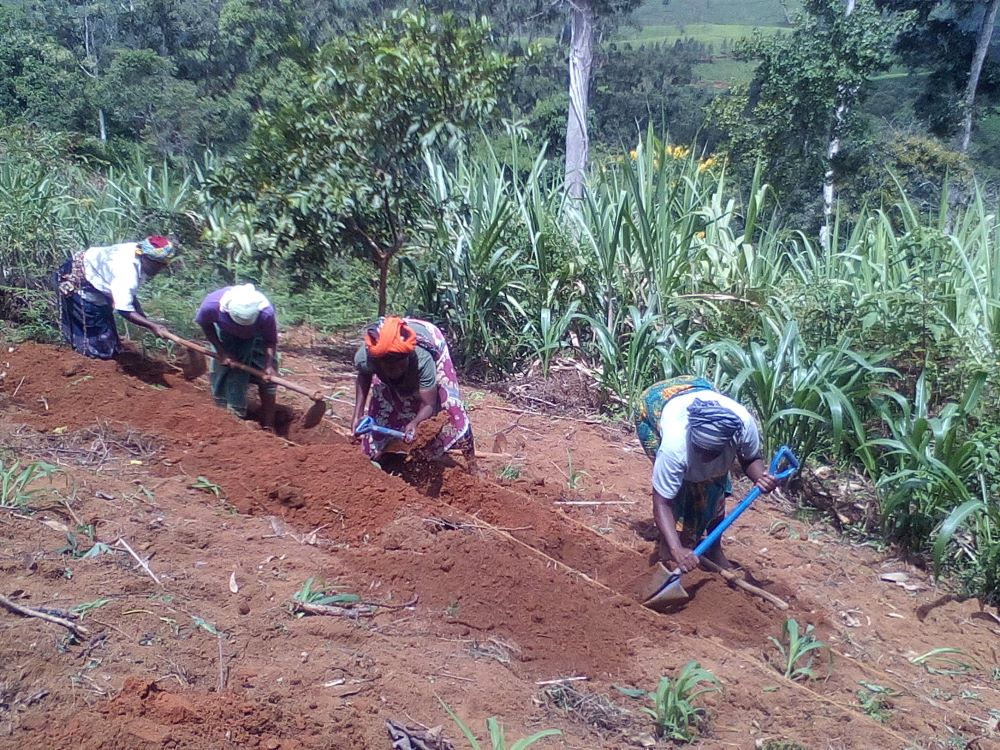
Despite its low contribution to greenhouse gas emissions, Africa is the most vulnerable continent to climate change. Today, on World Africa Day, we are highlighting some of the important work that Leeds researchers are involved in.
University of Leeds academics are collaborating with their African counterparts, governments and other stakeholders on projects exploring both mitigation and adaptation to climate change. They are working to provide communities with innovative solutions to meet challenges through technology and new skills.
This work extends from the skies to the sea, drawing on the expertise and drive of University researchers in fields ranging from meteorology to empowering small-scale farmers.
Weather forecasting
Weather forecasting in Africa can affect the livelihoods of millions and in some cases be a matter of life and death. With climate change causing pressure on agricultural and fishing communities in particular, accurate weather forecasting is only going to increase in importance as the number and severity of storms and floods rise.
Yet many people in Africa struggle to access reliable forecasts.
The GCRF African Science for Weather Information and Forecasting Techniques (African-SWIFT) programme is working with scientists in national weather services in African countries – drawing on their local knowledge to improve data interpretation and measurement tools.
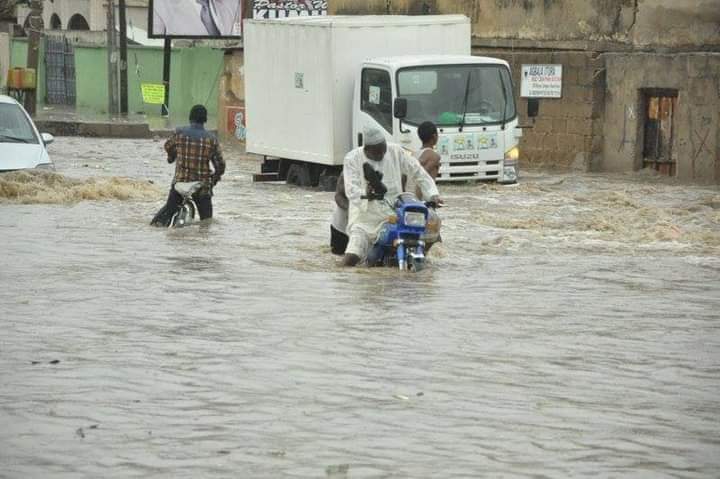
Flooding in Kano, Nigeria in July 2020. Photo by Kamoru Abiodun Lawal, GCRF African SWIFT.
The project is helping to ensure that high quality satellite data benefits people on the ground. The partners are working to develop and apply software that shows where storms are and where they’re headed.
Communicating that information is also vital. In Senegal, for example, SMS messaging means fishermen can be warned about approaching storms so they don’t put to sea on particular days. Watch our video to find out more about the African-SWIFT project and the researchers involved.
Scientists are also using weather forecasts to predict the location and scale of impending meningitis outbreaks in sub-Saharan Africa, providing an early warning system which allows health agencies to activate emergency response plans.
African-SWIFT and the African Centre of Meteorological Applications for Development can give up to a fortnight’s warning of the hot, dry and dusty conditions ‘likely’ or ‘highly likely’ to trigger a meningitis outbreak. Weekly meningitis vigilance maps are produced during the dry season.
Water scarcity
The University of Leeds has also played a leading role with African partners in a six year project to address the growing problem that water scarcity poses for farmers in east Africa.
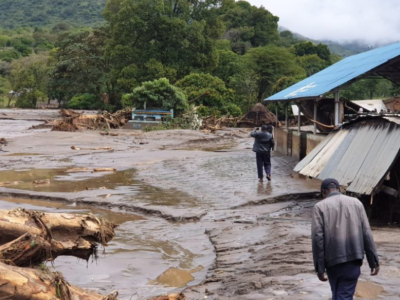
Floods and landslides ripped through areas of West Pokot in November 2019. Photo by Kenya Red Cross.
Linked to a World Meteorological Office programme, HyCRISTAL is developing a new understanding of variations in water supply in the region. It is supporting regional decision-makers to take long-term decisions around water management that reflect east African priorities in a time of climate change.
Peatland preservation
A team led by Professor Simon Lewis, with support from the UK’s Natural Environment Research Council, is helping keep up to 30bn tonnes of carbon stored in the world’s largest peatland after mapping it for the first time. At 145,000 square kilometres, it is larger than England and spans both the Republic of Congo and the Democratic Republic of the Congo.
Following the team’s discovery, the two governments signed an historic agreement to protect and preserve the rich ecosystem – preventing the escape of carbon into the atmosphere.
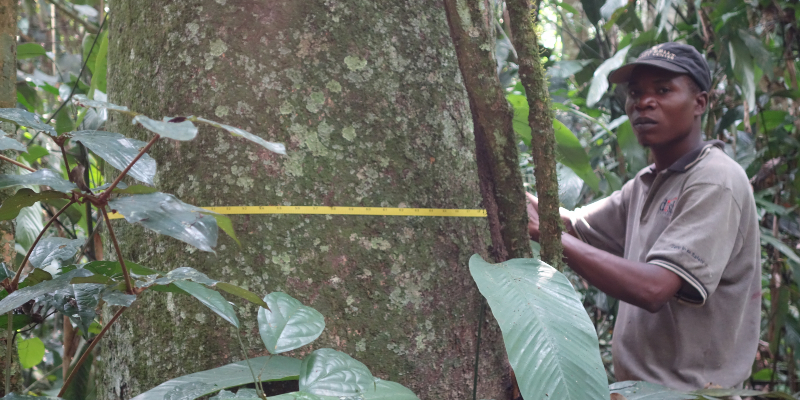
Tree measuring. Photo by Simon Lewis.
However, human activity also indirectly threatens the peatland and rising temperatures could still see it release – rather than store – carbon. The CongoPeat programme continues to work with experts from five Congolese organisations and other UK universities to assess the risks and learn more about this globally significant ecosystem.
Sustainable agriculture
The development of sustainable agriculture in Africa is a constant challenge. Experts from the University have been involved in a project which seeks to give a genuine voice to small-scale Gambian and Tanzanian farmers in both national policymaking and in an international marketplace dominated by multinationals.
Through the AFRICAP programme, University staff are working with local organisations and governments in Malawi, South Africa, Tanzania and Zambia to build the evidence base for long-term solutions to the challenges facing farming in sub-Saharan Africa.
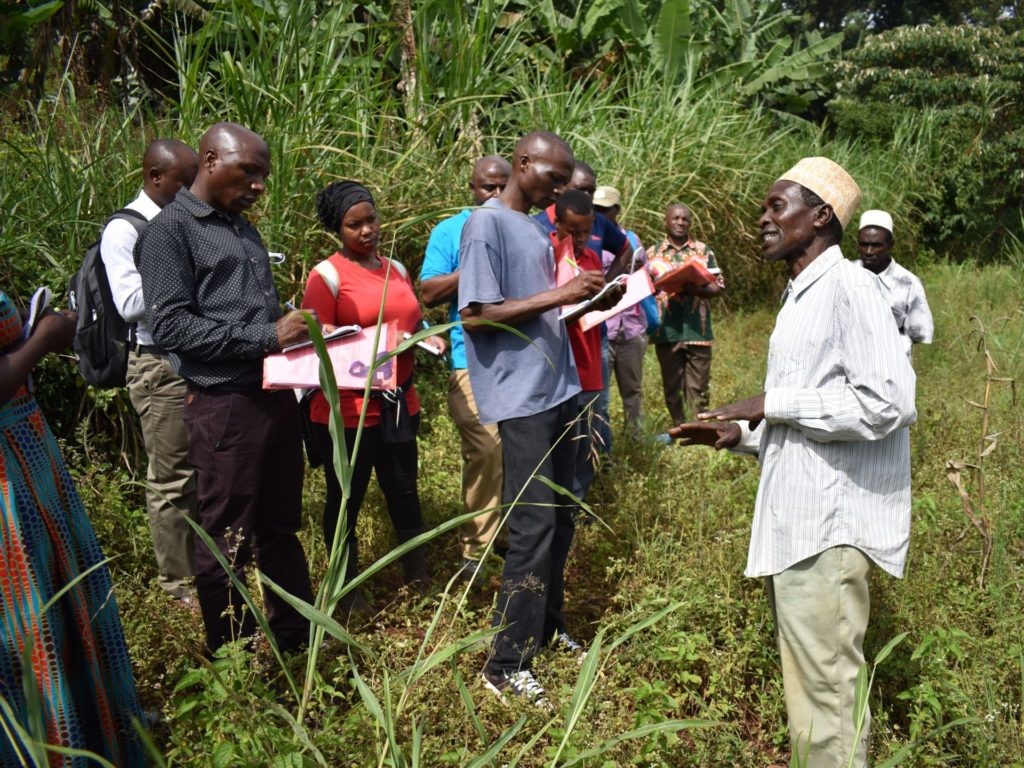
Government officials, extension officers, farmers and researchers learning about Climate Smart Agriculture during the AFRICAP study tour in Tanzania. Photo by Daniel Semberya.
The programme is developing country-specific policies in agriculture and food production based around four themes, each involving a team of local and University of Leeds specialists. These themes include food systems research, climate smart development, policy design, and capacity building.
Rising to the challenge
The impacts and implications of climate change are immense and are unlikely to subside any time soon. These projects illustrate some of the projects that Leeds academics involved in, working with African governments, academics and, populations to meet the scale of the challenge.
To hear more about these themes and other projects, you can watch the discussion of priorities for Africa that we convened ahead of the UN climate change conference, COP26.
Top image: Muheza District farmers using climate-smart agriculture techniques, credit Sylvester Mziray.
